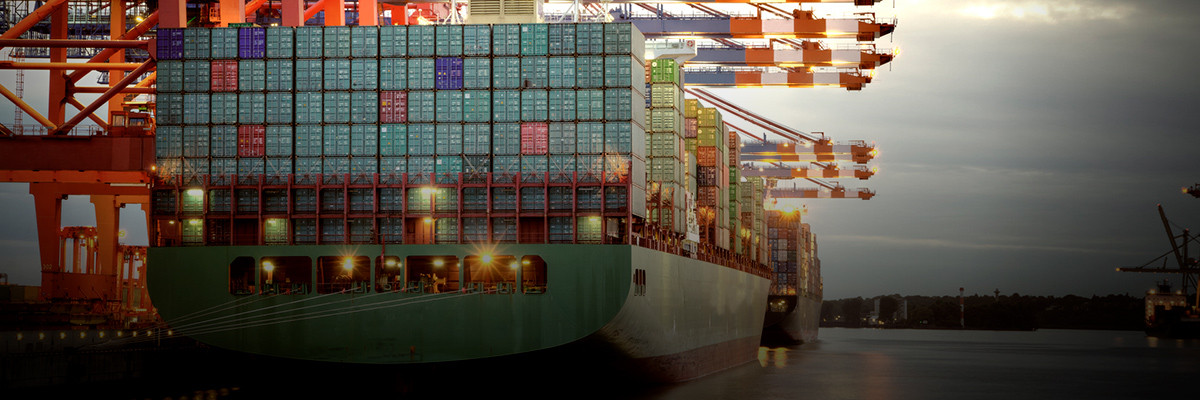
Authors
-
Dominic Maes
Former Manager, Communications and Marketing, BSR
-
Maurice Meehan
Former Manager, BSR
-
Angie Farrag-Thibault
Former Director, Collaborative Initiatives and Transport and Logistics, BSR
For Argentina, you’ll need cash. For the Suez Canal, take cigarettes. And for some West African ports, make sure you carry some frozen chickens.
Any shipping company reading this knows what we’re talking about: facilitation payments. In many ports and canals around the world, captains wishing to dock, pass, leave, or benefit from any other service are obliged to hand over some kind of illegal incentive.
Captains can say no to these demands, but they risk major delays that harm their standing and rack up costs—or sometimes face threats to their vessels or their personal safety. And a single shipping company can back up its captains, but if the company is acting alone, it might put itself at a competitive disadvantage.
Around 90 percent of products in the global trade system are transported by sea and pass through ports and the maritime value chain. For the well-being of the global economy, it’s vital that these passages are smooth and uncomplicated. Over the past decades, shipping companies have displayed an increasing commitment to tackling facilitation payments and corruption more generally. But they can’t do it on their own.
This need for collective action on corruption in the maritime industry led to the creation of the Maritime Anti-Corruption Network (MACN), an idea first discussed among a small group of companies in 2011 and formally established with BSR as the secretariat and lead facilitator in 2012. MACN’s aim is to promote good corporate practice in the maritime industry for tackling bribes, facilitation payments, and other forms of corruption by adopting the MACN Anti-Corruption Principles, communicating progress on implementation, sharing best practices, and creating awareness of industry challenges.
Real Impacts around the World
Since its establishment, MACN has quickly become a world-leading and award-winning example of the power of collective action—where member companies unite with stakeholders, including port and customs authorities, NGOs, and governments, to undertake risk assessments and implement programs that tackle corruption in ports and throughout the maritime value chain. The essence of the MACN collective action approach is that successful, lasting changes in the operating environment will take effect only if they are enabled and supported by and beneficial to key stakeholders. As such, MACN involves these key stakeholders in both assessing the challenges and devising the solutions.
What does this mean in practice? After conducting the risk assessments, MACN identifies actions for improvement. These actions will differ across locations or situations, depending on the root causes of the corruption challenge identified. So far, MACN has initiated and conducted collective action projects in Nigeria, Indonesia, Egypt, and Argentina. In Nigeria, the focus has been on face-to-face integrity training, the harmonizing of regulations, and the establishment of grievance mechanisms. In Indonesia, the focus has been on the improvement of container-tracking information technology systems, the promotion of an electronic governance system for cashless export licenses, and the integration of whistleblowing into existing procedures.
These collective actions have resulted in tangible outcomes and long-term impacts, including the passing of new legislation (in Argentina), a decrease in waiting times, and a decrease in demands.
And that’s not all. While collective actions are one key element of MACN’s theory of change, it is equally important for companies operating in the maritime value chain to collectively improve their anticorruption internal practices to ensure that they are prepared to respond to demands. MACN has helped strengthen the policies and processes of its members through formal and informal best practice sharing to implement the MACN Anti-Corruption Principles.
The impacts to date of the network are highlighted in the MACN Impact Report 2016. The report illustrates MACN’s tangible impact on both internal practices and the operating environment, with real changes taking place in ports around the world and in companies’ responses and preparations.
MACN’s 2020 Strategy: Responding to New Challenges
However, the external environment is changing. The business world is experiencing a diverse and strong array of disruptions, both economic and otherwise. These disruptions raise new challenges concerning ethics and responsibility. In response, MACN’s approach must deepen to ensure that the network remains relevant and faithful to our members, funders, and vision.
To achieve this, MACN will focus on building the capability of our members and civil society, building a culture of integrity across all aspects of shipping and ports, and enhancing collective action to drive sustainable change in the operating environment.
MACN has become a leading example of the power of collective action from business. Now, with its 2020 strategy, MACN is looking to scale and deepen its response to corruption, focusing on wholesale change in the operating environment. We invite all companies involved in the maritime value chain to get “on board” and join more than 75 members working toward a maritime industry free of corruption to the benefit of society at large.
BSR’s latest sustainability insights and events straight to your inbox.
Let’s talk about how BSR can help you to transform your business and achieve your sustainability goals.